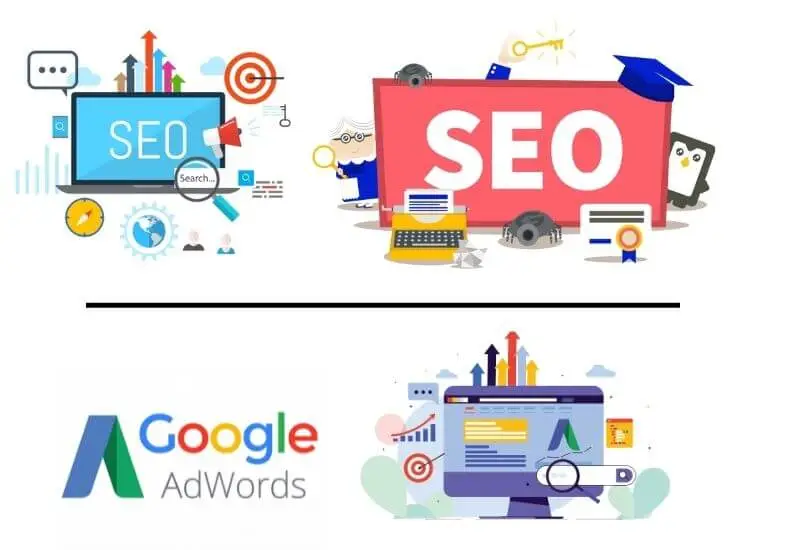SEO and Google AdWords: What’s the difference? – We often use organic website promotion with SEO and AdWords (Google Ads): what is the difference between popular internet marketing tools?
Table of Contents
SEO and Google AdWords: difference between
Despite the apparent similarity, SEO and Google Ads are two completely different website promotion tools that serve different purposes. Before you decide to choose one of them, you have to find out which best suits the needs and expectations of your business.
Planning activities in the field of Internet marketing
Let’s start with key definitions:
- Positioning : The main task of positioning – often referred to as SEO – is to improve the visibility (position) of a website for selected key phrases in organic search results.
- Google Ads : An extensive advertising system that displays ads both in the SERPs and on sites owned by Google partners. The most popular form of Google advertising is sponsored links (called AdWords), which is why text ads are visible in Google search results.
You must answer several important questions:
- How long do we want to promote the site?
- What target audience do we want to reach?
- What qualities should our target group meet?
- Can we afford to wait for the effects of SEO promotion?
- Is the offer we want to promote seasonal or frequently changing?
- What financial resources can we spend on monthly website promotion?
Knowing the answers to the above questions and the characteristics of specific tools (eg organic positioning campaigns and sponsored links), we can make an informed decision regarding the choice of promotion method.
It is worth remembering that the best results are achieved through a well-designed marketing strategy that takes advantage of both Internet marketing tools in combination or sequentially.
Instant AdWords vs Continuous SEO
Due to the specifics of their work, sponsored links have the effect of instantly increasing the visibility of the site in Google search results when the campaign is launched. It takes much longer to see the effects of organic positioning, sometimes several weeks, but SEO tends to have a longer and more stable effect.
There is an opinion among Internet user behavior experts that links visible in organic search results are more likely to be processed by potential customers than links visible in the sponsored link area.
What determines the cost per click on an ad?
In a nutshell, the cost per click on an ad depends on the quality of the ad.
Google rewards message quality, so clicks on ads with a high Quality Score are relatively cheaper than clicks on ads with a lower Quality Score.
In addition, “good” ads appear at higher positions in Google AdWords search results.
Of course, the problem of determining the cost per click of an ad that is displayed for a given keyword is much more complicated. It takes into account the value of the maximum CPC, that is, the highest price that an advertiser is able to pay per click, and the Quality Score, which consists of various factors evaluated by Google (keyword relevance, ad text accuracy, quality of the target site, and more).
All this means that one advertiser can pay less for a click on the same phrase, and another more.
Duration of the effect of AdWords and SEO
In the case of promotional links, the duration of the promotion depends on the duration of the campaign. After the end of the campaign, the service immediately disappears from the pool of advertising links, so the link is no longer visible in the search engine. Users stop seeing you, as if the site has never been in the top.
The situation with organic positioning is slightly different. The effect persists even after the end of the active promotion of the site.
In the past, when SEO activity was not yet so intense and search engine algorithms did not change as frequently, the effects of organic positioning lasted up to several months.
Of course, everything depended on the competitiveness of the selected keywords and the SEO activity of competing sites.
The Cost of AdWords and SEO Promotion
Google AdWords campaigns are pay-per-click (PPC) campaigns. This means that we only pay for ads when they are clicked by a browser user. The cost of clicks is very different, and depends on the competitiveness of the phrase – it can vary from one cent to several dollars or so.
In the case of organic positioning, we only pay for the cost of SEO specialists, but we do not pay for site visits. Until recently, the most popular form of accounting for services was results-based pricing, meaning that the SEO agency only charged an agreed-upon fee when the promoted site ranked in the search results.
Subscription-based SEO pay is becoming more and more popular these days.
Target audience of Internet marketing
Organic site positioning allows you to reach users who entered a specific query or phrase in the search engine’s query box. These can be both potential customers and people who are looking for information about a particular product/service.
The site owner has no influence on their age, gender or place of residence. The latter is especially important in the case of on-site services. An AdWords campaign gives you a lot more options.
Read Also: 40 SEO Mistakes that are easy to avoid in 2022
In truth, the promotional link campaign seen in search engine results also extends to international user queries. But by using AdWords to target the Display Network, that is, sites partnered with Google, we can pinpoint ad recipients—male or female, of a certain age and specific interests.
Unfortunately, in this case, too, the targeting is incomplete – focusing on the ad network, we are never sure if potential recipients are interested in our offer.
Therefore, most investors choose AdWords campaigns based on the links that are visible in the search engine for given keyword phrases.
We’ve only discussed the most significant differences between SEO vs Google Adwords. In practice, there are many more differences, and understanding them will allow you to promote your website more effectively.

Pradeep Sharma is a author the mind behind Techjustify, where I craft insightful blogs on technology, digital tools, gaming, AI, and beyond. With years of experience in digital marketing and a passion for tech innovation, I aim to simplify complex topics for readers worldwide.
My mission is to empower individuals with practical knowledge and up-to-date insights, helping them make informed decisions in the ever-evolving digital landscape.


